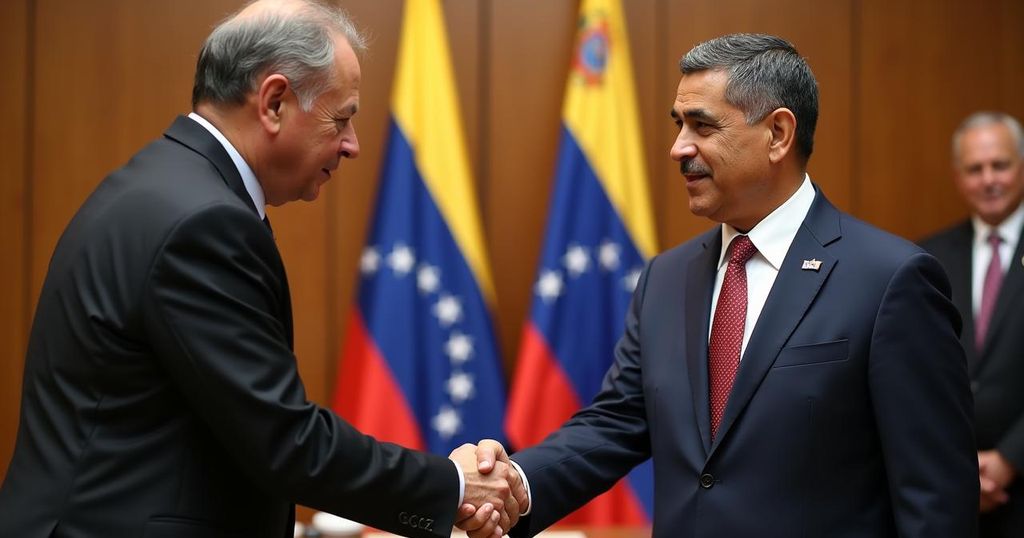Prime Minister Dr. Ralph Gonsalves of St. Vincent and the Grenadines contended that Nicolas Maduro’s presidency in Venezuela is advantageous for Guyana’s oil industry. He emphasized the dangers of a right-wing opposition that could compromise Guyana’s interests and insisted on peaceful resolutions to territorial disputes. Gonsalves also supported the notion that recent Venezuelan elections were fair, while challenging the U.S.’s historical electoral stance in Latin America.
Prime Minister Dr. Ralph Gonsalves of St. Vincent and the Grenadines articulated that the presidency of Nicolas Maduro in Venezuela aligns favorably with the interests of Guyana’s burgeoning oil sector. Speaking at the funeral of Sir Shridath Ramphal, a distinguished Guyanese statesman, Gonsalves emphasized that Venezuelans’ rejection of right-wing opposition serves to bolster Guyana’s oil industry stability. Gonsalves stated, “If you have a choice between Maduro and the right wing in Venezuela, I advise you to choose Maduro. The right wing will seek to allow the Americans to take the oil in Venezuela, to set up to take over PDVSA (State oil company) and try to run Guyana’s oil industry from Caracas.” As a historic ally of Maduro, Gonsalves was one of the first Caribbean leaders to congratulate him after his victory in July’s elections. Furthermore, the Prime Minister assured that he would oppose any military actions from Venezuela regarding the Essequibo Region, stating, “Anytime, if Venezuela attempts to do anything militarily, you’ll hear that I speak against it… Under anybody. No war. You have a problem, you talk about it, you solve it.” He called for peaceful dialogue, expressing the desire for cordial relations between Venezuela and Guyana. Gonsalves, a long-serving leader within CARICOM, elaborated on the historical tendency of Venezuela’s right-wing factions to adopt aggressive stances against Guyana, particularly regarding territorial claims. In defending his assertion that the recent Venezuelan elections were “fair and free,” Gonsalves referenced the historical U.S. interventionist policies which have undermined democratically elected governments in Latin America since the 1970s. He remarked, “America can’t teach me about elections and democracy. In my lifetime, I watched what has happened.” Compounding these opinions, both Guyana and Suriname welcomed U.S. investments in their oil sectors and have advocated for the verification of ballots from the Venezuelan elections. This stance was not uniform across the region, which led to U.S. Ambassador Nicole Theriot expressing dissatisfaction with the lack of consensus among regional nations. Gonsalves countered claims of being anti-American, insisting on the importance of relations with the United States, while also criticizing historical interventions under the Monroe Doctrine that sought to maintain U.S. control over its “backyard” and other political interests.
Dr. Ralph Gonsalves’ commentary on the Venezuelan political landscape is particularly significant given Venezuela’s historical and ongoing geopolitical tensions with Guyana. The Essequibo Region, claimed by Venezuela, has been a point of contention and conflict, necessitating a delicate balance in diplomatic relations. As Guyana pivots toward oil production and foreign investment, particularly from the United States, the political stability of neighboring Venezuela under Maduro becomes crucial. Gonsalves’ position reflects the broader dynamics of Caribbean politics, historical relations with the United States, and the implications of Venezuelan politics on regional security and economic prospects.
In summary, Prime Minister Dr. Ralph Gonsalves posits that the continued presidency of Nicolas Maduro in Venezuela is beneficial to the security and development of Guyana’s oil industry. By advocating for a peaceful resolution to territorial disputes and criticizing U.S. interventions in Latin America, Gonsalves presents a nuanced view reflecting Caribbean political sensitivities. The need for regional cooperation amidst geopolitical challenges underscores the complex relationship between Guyana, Venezuela, and external powers.
Original Source: caribbean.loopnews.com







